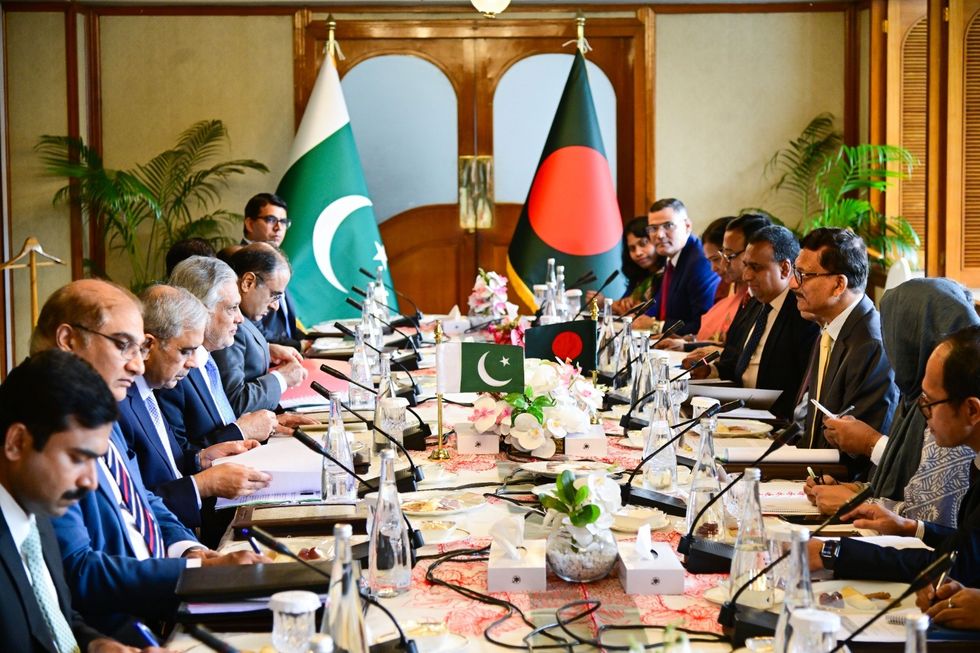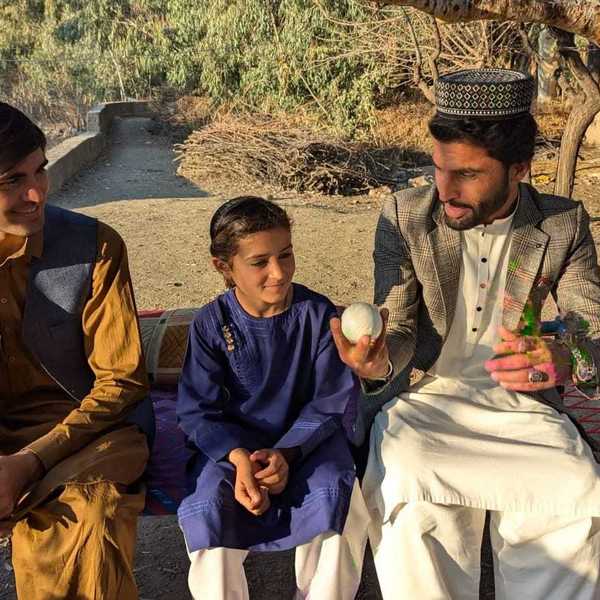Pakistan, Bangladesh sign six agreements in landmark Dhaka visit
Six accords cover trade, media, cultural exchange, and diplomacy as Foreign Minister Ishaq Dar continues Dhaka visit
News Desk
The News Desk provides timely and factual coverage of national and international events, with an emphasis on accuracy and clarity.

Following delegation-level talks, Foreign Minister Ishaq Dar and Bangladesh’s Foreign Adviser Md. Touhid Hossain oversaw the signing of the agreements
FO
Pakistan and Bangladesh signed six agreements on Sunday aimed at boosting cooperation in trade, diplomacy, media, and culture, marking a major step forward in bilateral relations during Foreign Minister Ishaq Dar’s landmark two-day visit to Dhaka.
Following delegation-level talks, Dar and Bangladesh’s Foreign Adviser Md. Touhid Hossain oversaw the signing of the agreements. They include a visa abolition deal for diplomatic and official passport holders, the creation of a joint working group on trade, and an MoU between the foreign service academies of both countries.
Other agreements cover media cooperation between the Associated Press of Pakistan and Bangladesh Sangbad Sangstha, collaboration between Islamabad’s Institute of Strategic Studies and the Bangladesh Institute of International and Strategic Studies, and a cultural exchange program.
Deputy Prime Minister and Foreign Minister, Senator Mohammad Ishaq Dar @MIshaqDar50, held wide-ranging talks with the Foreign Adviser of Bangladesh, H.E. Md. Touhid Hossain in Dhaka. Both sides reviewed entire gamut of bilateral relations, including high level exchanges , trade… pic.twitter.com/nqELdHhbjU
— Ministry of Foreign Affairs - Pakistan (@ForeignOfficePk) August 24, 2025
Knowledge corridor
Coinciding with Dar’s visit, Pakistan announced the launch of the “Pakistan-Bangladesh Knowledge Corridor.” The project includes 500 scholarships for Bangladeshi students to pursue higher studies in Pakistan over the next five years, with one-fourth reserved for medicine.
The initiative also provides training for 100 Bangladeshi civil servants during the same period. In addition, Pakistan has decided to expand scholarships for Bangladeshi students under the Pakistan Technical Assistance Program, increasing the allocation from five to 25.
Dar’s visit — the first by a Pakistani foreign minister to Bangladesh in 13 years — is being described by Islamabad as a “significant milestone” in resetting relations after decades of strain. The trip comes one year after the ouster of Prime Minister Sheikh Hasina Wajid, long regarded as a major obstacle in Pakistan-Bangladesh ties.

On Sunday, Dar and Hossain also discussed the full spectrum of bilateral relations, including high-level exchanges, economic cooperation, cultural and educational initiatives, and humanitarian concerns. Regional and international issues were on the agenda as well, with both sides addressing the rejuvenation of the South Asian Association for Regional Cooperation (SAARC), along with the situations in Palestine and Rohingya refugee camps.
Talks were described as constructive, reflecting goodwill and cordiality between the two nations. Hossain hosted a lunch in Dar’s honor following the meetings.
Deputy Prime Minister and Foreign Minister Senator Muhammad Ishaq Dar @MIshaqDar50 had a breakfast meeting with Bangladesh Adviser for Commerce Sk. Bashir Uddin. Minister of Commerce Jam Khamal Khan also joined the meeting. The Adviser Commerce was accompanied by
Chowdhury Ashik… pic.twitter.com/4JObXtxVAb
— Ministry of Foreign Affairs - Pakistan (@ForeignOfficePk) August 24, 2025
Dar arrived in Dhaka on Saturday at the invitation of the Bangladeshi government, where he was received by senior officials at Hazrat Shahjalal International Airport. His visit signaled a cautious but notable thaw in ties between the two South Asian neighbors, whose relations have long been overshadowed by the legacy of the 1971 war that led to Bangladesh’s independence.
Shortly after his arrival, Dar met with leaders of the National Citizen Party, led by Akhtar Hossain, and emphasized the importance of greater youth engagement and cultural exchanges. The delegation briefed him on political mobilization in 2024.
He also held separate meetings with delegations from the Bangladesh Nationalist Party and Jamaat-e-Islami. In talks with BNP Secretary General Mirza Fakhrul Islam Alamgir, Dar reaffirmed Pakistan’s commitment to strengthening ties on the basis of mutual respect and shared benefit.
Deputy Prime Minister and Foreign Minister, Senator Mohammad Ishaq Dar @MIshaqDar50 attended a reception, hosted in his honour by the High Commissioner for Pakistan to Bangladesh, Mr Imran Haider. At the reception , the DPM/FM interacted with a number of personalities from… pic.twitter.com/yY82J0YAX3
— Ministry of Foreign Affairs - Pakistan (@ForeignOfficePk) August 24, 2025
In another meeting, he praised Jamaat leaders, led by Dr Syed Abdullah Mohammed Taher, for what he called their “courage and steadfastness” in facing hardships, while stressing constructive engagement to foster bilateral understanding.
The visit comes amid shifting regional dynamics. Bangladesh’s relations with India, once its closest ally, have deteriorated since Hasina’s ouster, while Pakistan’s own ties with New Delhi remain tense following a brief border clash in May.
Hasina fled to India after her government’s downfall and now faces charges of crimes against humanity in Bangladesh, a development that has further strained Dhaka’s relations with New Delhi.
Analysts say the political realignment could allow Bangladesh to diversify its alliances and give Pakistan an opening to regain influence in the region.
“The toppling of Hasina was a strategic setback for India, and the improved relations between Bangladesh and Pakistan are a consequence of her ouster,” said Thomas Kean of the International Crisis Group.
Observers suggest Dar’s visit, and the agreements signed Sunday, may mark the beginning of a new chapter in Pakistan-Bangladesh relations, shaped both by their shared history and shifting geopolitics in South Asia.
With additional input from AFP.







Comments
See what people are discussing